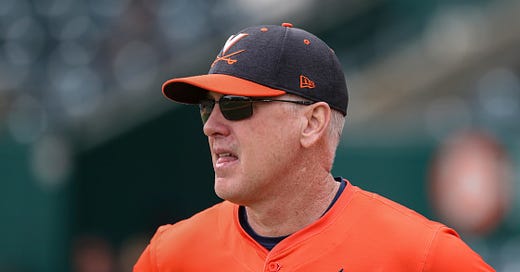Get out your checkbook
Virginia's coaching carousel is a red flag in a seismic college sports landscape.
Associated Press photo
Between happy hours on reunion weekend at the University of Virginia, I sat in on a seminar dubbed: “The Changing Landscape of College Athletics.” When I rejoined several of my fellow alums later, their first question was whether I learned anything.
“We need more money,” I replied, paraphrasing the presenters.
That really wasn’t a revelation; anyone who’s followed intercollegiate sports for any amount of time knows the score. It’s striking, though, how exponential that need has spiked in recent years. And if anyone understands the stakes, it’s the Cavaliers.
Monday’s news that longtime baseball coach Brian O’Connor has been wooed away by Mississippi State should serve as the latest red flag.
Less than a year after Tony Bennett stepped down in frustration over the unchecked flood of transfers and Name, Image and Likeness (NIL) bidding, O’Connor — who, like Bennett, won a national title at Virginia — bailed for a school that pledged more spending on its program.
That’s saying something, because last summer, O’Connor signed a three-year extension worth roughly $1.4 million annually, which reportedly made him one of the nation’s top 10 highest-paid coaches.
But as advertised in the seminar, things aren’t what they used to be. And programs like Virginia which have thrived in recent years are facing an unprecedented challenge to stay competitive that can only be solved with greenbacks.
Jason Baum, the Cavaliers’ Deputy Athletics Director for Legal and Regulatory Affairs, did his best to avoid putting the audience to sleep with the lengthy details of the House vs. NCAA lawsuit that should soon be settled. Essentially, that will pave the way for each Division I school to share roughly $20.5 million annually with its athletes.
You can guess which jocks will get the bulk of that money: football and men’s basketball players, with women’s hoops standouts and a few other elite athletes also cashing in and everyone else fighting for scraps. Athletes are also still eligible for NIL benefits, although the suit hopes to ensure that any such deal must go through an NCAA clearing house. (If you think that will prevent all cheating, I have some Tesla stock to sell you.)
O’Connor’s exodus comes amid reports that Mississippi State — a program that once had MLB All-Stars Will Clark and Rafael Palmeiro at the same time but has dropped off in recent years — is making a big commitment to NIL. And the Bulldogs play in the Southeastern Conference, whose schools receive about $20 million more annually than Virginia and most of its ACC brethren.
Forum moderator Ryan Schulman of the Virginia Athletic Foundation, the school’s fund-raising arm, reported that the baseball program had received $1.5 million in pledges in the previous 36 hours after word of Mississippi State’s pursuit of O’Connor broke. It obviously wasn’t enough to keep O’Connor and most of his staff from bolting, and to prevent a dozen Cavaliers — including all-ACC outfielder Henry Ford — from joining the transfer portal. Don’t be surprised if many of them follow O’Connor to Starkville.
Saturday’s panelists insisted — with some merit — that Virginia was in “a strong position” moving forward. Only North Carolina (four) won more ACC team titles than the Cavaliers’ three in the just-concluded academic year. The women’s swim team has captured five straight NCAA championships, and the men’s golf team was a surprising national runner-up.
But losing Bennett and O’Connor in the same academic year is telling. And football — the highest-profile and costliest program at any school — hasn’t had a winning season since 2019. Tony Elliott’s seat will be one of the hottest in the country this fall.
Athletic director Carla Williams managed to find a worthy successor to Bennett in Ryan Odom, who pulled a historic upset of top-seeded Virginia in 2018 and has won at every stop. But Odom, like so many other coaches, will essentially start from scratch after all of last year’s starters transferred or graduated. For his final collegiate season, top scorer Isaac McKneely chose a program (Louiville) with deeper NIL pockets — the very force that served as the last straw for Bennett.
Williams may well unearth the next hot coach to succeed O’Connor. But Virginia’s revenue deficit isn’t going away before 2036, when the ACC’s media contracts expire. Schulman probably wasn’t exaggerating when he said: “the next 3-5 years will determine our fate for maybe the next 50 years.”
Virginia recently announced a new seating plan at John Paul Jones Arena to squeeze more money out of top donors and fund two dozen more scholarships. That should help — for now. But like everything else, the price tag for college sports keeps rising, with no apparent end in sight.




